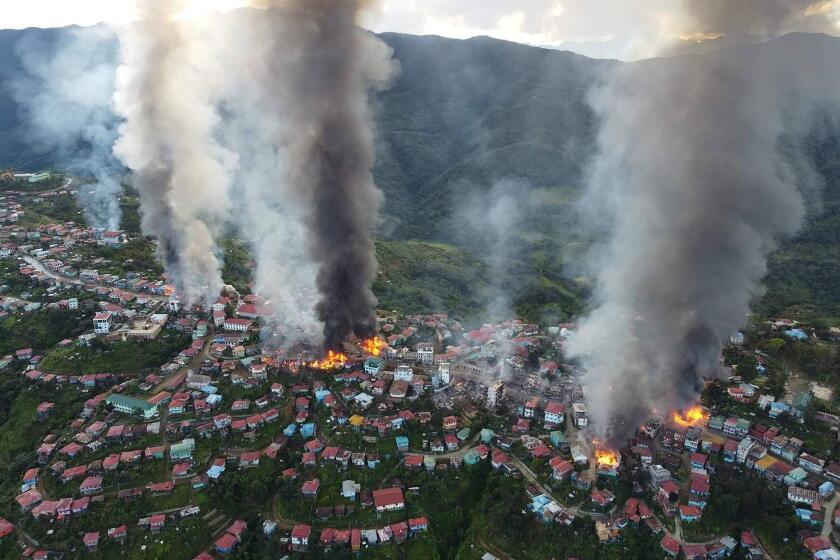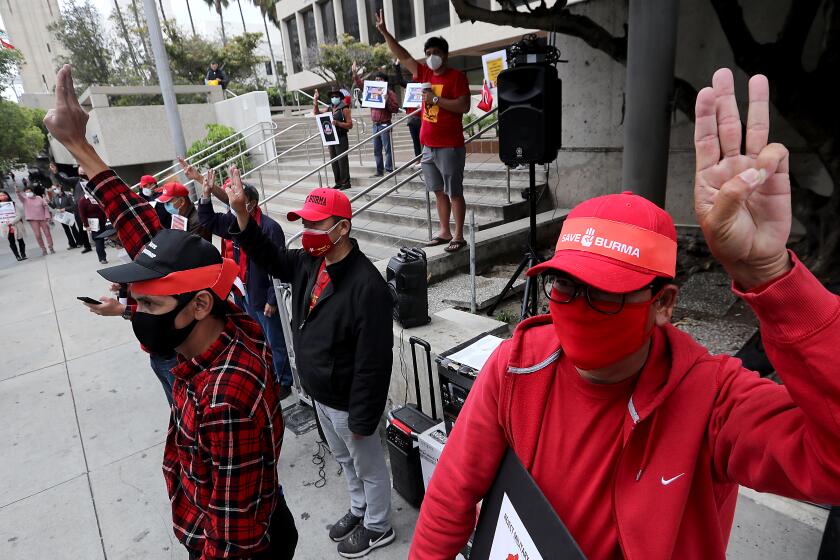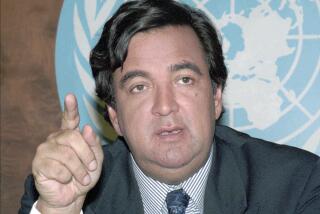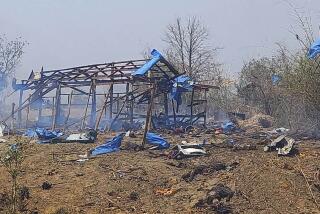Bill Richardson defends his private mission to Myanmar, calling it constructive
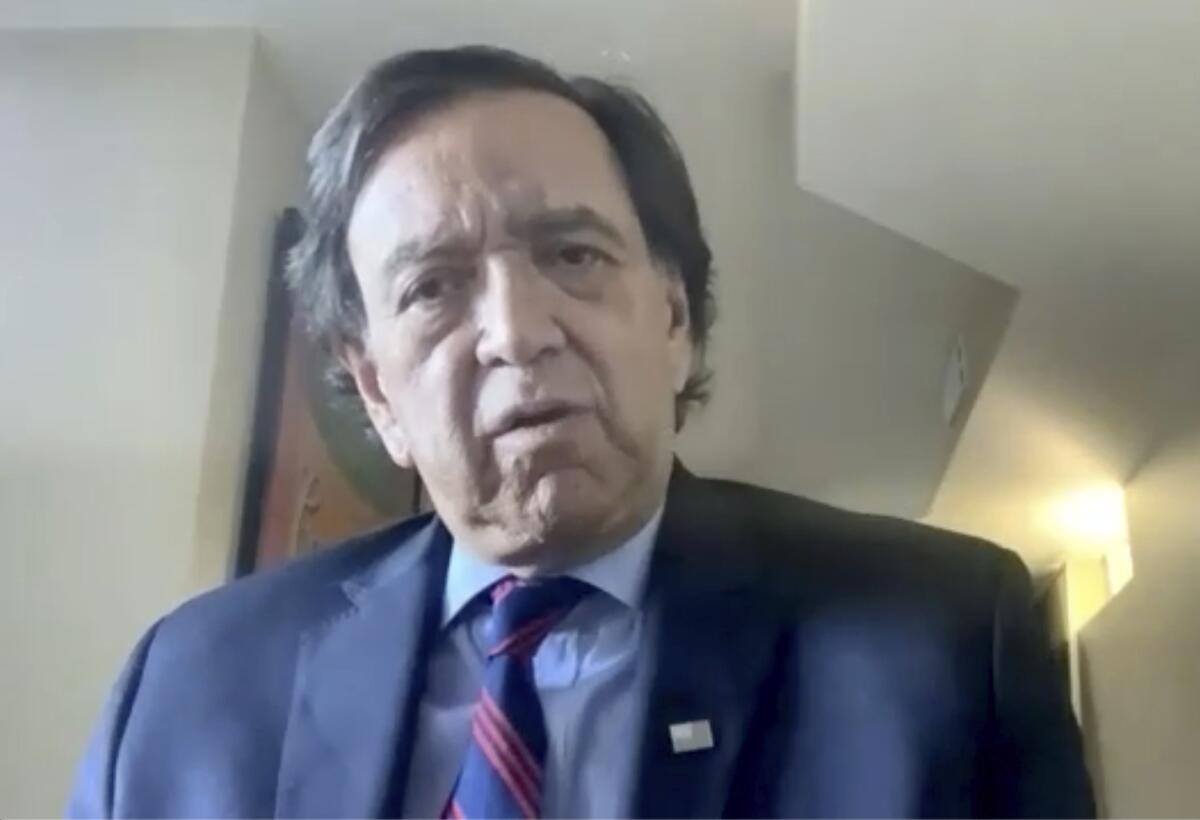
)
- Share via
BANGKOK, Thailand — Former U.S. Ambassador to the United Nations Bill Richardson said Monday that his private humanitarian visit to Myanmar was constructive, but acknowledged criticism of the trip.
Richardson, also a former governor of New Mexico, is the highest-profile American to visit the Southeast Asian nation since its military seized power in February from the elected government of Aung San Suu Kyi. Richardson traveled there last week with three colleagues, his office said, to discuss delivery of COVID-19 vaccines, medical supplies and other public health needs.
The U.S. government, along with a number of other Western nations, shuns Myanmar’s military junta and urges a return to democracy.
“I’m deeply invested in this country and they invited me,” Richardson said in an online interview with the Associated Press on Monday from Cape Cod, Mass. “I have a letter from the foreign minister to talk about vaccines. ... That’s what I was invited to do. And I care about the country and I think I can make a difference. It’s a small difference.”
Richardson has a long history of involvement with Myanmar, starting in 1994 when, as a member of Congress, he met Suu Kyi at her home in the city of Yangon, where she had been under house arrest since 1989 under a previous military government.
He last visited Myanmar in 2018 to advise on a crisis over the country’s Muslim Rohingya minority. More than 700,000 Rohingya fled to refugee camps in Bangladesh after Myanmar’s military in 2017 launched a brutal counter-insurgency campaign in the western state of Rakhine, where most lived.
The U.N.’s humanitarian chief is urging Myanmar’s military junta to allow unimpeded access to more than 3 million people in desperate need of help.
Since this year’s military takeover, violence has swept through much of Myanmar. Widespread peaceful demonstrations against army rule were savagely suppressed by security forces, and armed resistance has grown to the point that U.N. experts have warned that the country risks sliding into civil war.
The instability has also caused a humanitarian crisis, with food supplies badly disrupted and a breakdown of the already feeble public health system in one of Asian’s poorest countries. When a new wave of the coronavirus hit during the summer, crematoria in Yangon struggled with a backlog of bodies.
Opponents of the military-installed government who are conducting a civil disobedience campaign inside the country want the outside world to treat the generals as pariahs. Richardson, as a prominent U.S. political figure well-known in Myanmar, ran into a storm of online criticism for engaging with the government.
“Well, I knew that the trip would face some criticism,” Richardson said. But he disputed the idea that he could confer any kind of legitimacy on Myanmar’s government.
Burmese in the U.S. are protesting the brutal crackdown and urging global intervention. But it’s hard to overcome a lack of knowledge and interest.
Legitimacy, he said, “is conferred by the people and by governments. I’m neither. I’m one person, a citizen who cares deeply about Myanmar, who was invited to come in a situation where there’s horrendous violence, human hurting, humanitarian needs, vaccine needs. And I felt I could make a difference, and I believe I have.”
He said he realized that some might try to exploit his presence. But he was satisfied with what he said he had accomplished so far: the release from prison of a young woman who had worked for his Richardson Center for Global Engagement; increased access to humanitarian aid and vaccines; and a resumption of Red Cross visits to Myanmar’s prisons, which the government had banned because of the coronavirus.
Richardson said he avoided politics in his discussions, as he did in the interview with the AP.
“I didn’t want to get into politics. I think humanitarian assistance should precede any kind of movement that would just divide the people even more. This is a country in great need, a country I’ve been to many times. I’ve invested a lot of myself in this country, and 55 million people should not have to pay with bad vaccine distribution, humanitarian problems, for the political divisions,” he said.
Burmese punk band Rebel Riot’s lead singer embodies the growing outrage over the military coup. He’s now rallying others to resist.
Richardson said he met for about 90 minutes with Myanmar’s leader, Senior Gen. Min Aung Hlaing.
“We only talked about humanitarian access. We only talked about vaccines. He listened, he responded. It seemed like he liked my ideas,” Richardson said.
These ideas, he said, included the revival of the Red Cross prison visits and shortening the amount of time needed for travel permissions from the government for U.N. agencies and NGOs to carry out humanitarian missions, as well as finding ways to distribute vaccines more quickly and equitably.
“So it was a constructive discussion,“ he said.
Breaking News
Get breaking news, investigations, analysis and more signature journalism from the Los Angeles Times in your inbox.
You may occasionally receive promotional content from the Los Angeles Times.
Richardson also met with other top government officials; foreign diplomats, including the U.S. ambassador; and representatives of U.N. agencies and other international organizations.
“I think there’s been a logjam on activity and progress on the humanitarian front, the access to vaccines ... the humanitarian efforts,” he said. “So I think my visit may be a catalyst.”
More to Read
Sign up for Essential California
The most important California stories and recommendations in your inbox every morning.
You may occasionally receive promotional content from the Los Angeles Times.
